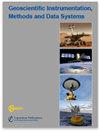GIS项目应用中全景图像模糊的解决方案体系结构
IF 2.3
4区 地球科学
Q3 GEOSCIENCES, MULTIDISCIPLINARY
Geoscientific Instrumentation Methods and Data Systems
Pub Date : 2021-11-23
DOI:10.5194/gi-10-287-2021
引用次数: 0
摘要
摘要激光扫描技术捕获的全景图像主要产生点云,易于应用于点云着色、精细视觉检测、道路缺陷检测、空间实体提取、多样化地图创建等方面。本文强调了图像在现代测量技术和不同GIS项目中的重要性,同时考虑到图像的依法匿名化。《通用数据保护条例》(GDPR)是一个法律框架,为收集和处理居住在欧盟(EU)的个人信息制定了指导方针。也就是说,立法要求在收集的数据中对人的面孔和车辆的牌照进行模糊处理。本文的目的是提出一种解决特定对象模糊问题的新架构。该体系结构被设计为目标检测算法的管道,逐步缩小搜索空间,直到检测到要模糊的对象。该方法在四个数据集上进行了测试,其中包括5000、10000、15000和20000张全景图像。对于每个数据集,准确率(即成功检测和模糊感兴趣的对象)的百分比高于97%。此外,我们的目标是实现效率和广泛使用。本文章由计算机程序翻译,如有差异,请以英文原文为准。
Architecture of solution for panoramic image blurring in GIS project application
Abstract. Panoramic images captured using laser scanning technologies, which principally produce point clouds, are readily applicable in colorization of point
cloud, detailed visual inspection, road defect detection, spatial entities extraction, diverse map creation, etc. This paper underlines the
importance of images in modern surveying technologies and different GIS projects at the same time having regard to their anonymization in accordance
with law. The General Data Protection Regulation (GDPR) is a legal framework that sets guidelines for the collection and processing of personal
information from individuals who live in the European Union (EU). Namely, it is a legislative requirement that faces of persons and license plates
of vehicles in the collected data are blurred. The objective of this paper is to present a novel architecture of the solution for a particular
object blurring. The architecture is designed as a pipeline of object detection algorithms that progressively narrows the search space until it
detects the objects to be blurred. The methodology was tested on four data sets counting 5000, 10 000, 15 000 and 20 000 panoramic images. The percentage of accuracy, i.e., successfully detected and blurred objects of interest, was higher than 97 % for each data
set. Additionally, our aim was to achieve efficiency and broad use.
求助全文
通过发布文献求助,成功后即可免费获取论文全文。
去求助
来源期刊

Geoscientific Instrumentation Methods and Data Systems
GEOSCIENCES, MULTIDISCIPLINARYMETEOROLOGY-METEOROLOGY & ATMOSPHERIC SCIENCES
CiteScore
3.70
自引率
0.00%
发文量
23
审稿时长
37 weeks
期刊介绍:
Geoscientific Instrumentation, Methods and Data Systems (GI) is an open-access interdisciplinary electronic journal for swift publication of original articles and short communications in the area of geoscientific instruments. It covers three main areas: (i) atmospheric and geospace sciences, (ii) earth science, and (iii) ocean science. A unique feature of the journal is the emphasis on synergy between science and technology that facilitates advances in GI. These advances include but are not limited to the following:
concepts, design, and description of instrumentation and data systems;
retrieval techniques of scientific products from measurements;
calibration and data quality assessment;
uncertainty in measurements;
newly developed and planned research platforms and community instrumentation capabilities;
major national and international field campaigns and observational research programs;
new observational strategies to address societal needs in areas such as monitoring climate change and preventing natural disasters;
networking of instruments for enhancing high temporal and spatial resolution of observations.
GI has an innovative two-stage publication process involving the scientific discussion forum Geoscientific Instrumentation, Methods and Data Systems Discussions (GID), which has been designed to do the following:
foster scientific discussion;
maximize the effectiveness and transparency of scientific quality assurance;
enable rapid publication;
make scientific publications freely accessible.
 求助内容:
求助内容: 应助结果提醒方式:
应助结果提醒方式:


